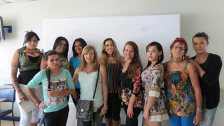
The UNESCO-UNEVOC International Centre: Who We Are | What We Do | Working With Us | Get in Touch
The UNEVOC Network: Learn About the Network | UNEVOC Network Directory
For Members: UNEVOC Centre Dashboard
Thematic Areas: Inclusion and Youth | Digital Transformation | Private Sector Engagement | SDGs and Greening TVET
Our Key Programmes & Projects: BILT: Bridging Innovation and Learning in TVET | Building TVET resilience | TVET Leadership Programme | WYSD: World Youth Skills Day
Past Activities: COVID-19 response | i-hubs project | TVET Global Forums | Virtual Conferences | YEM Knowledge Portal
Our Services & Resources: Publications | TVET Forum | TVET Country Profiles | TVETipedia Glossary | Innovative and Promising Practices | Toolkits for TVET Providers | Entrepreneurial Learning Guide
Events: Major TVET Events | UNEVOC Network News
As the global community observes the International Day against Homophobia, Transphobia and Biphobia![]() (IDAHOT) to draw the attention of policymakers and all social stakeholders to this issue, on the 17th May every year, it also calls for more action oriented pursuit of assuring inclusion and dignity. At the centre of such calls lies the creation of a more inclusive social and professional space for these members of the community. The Instituto Nacional de Aprendizaje (INA), Costa Rica – a member of the UNEVOC Network, emerges as an example of productive engagement in combating such discriminations.
(IDAHOT) to draw the attention of policymakers and all social stakeholders to this issue, on the 17th May every year, it also calls for more action oriented pursuit of assuring inclusion and dignity. At the centre of such calls lies the creation of a more inclusive social and professional space for these members of the community. The Instituto Nacional de Aprendizaje (INA), Costa Rica – a member of the UNEVOC Network, emerges as an example of productive engagement in combating such discriminations.

In its bid to play its role in enabling members of the Transgender community in Costa Rica, to have increased access to professional and training opportunities, INA has started an English for Business course for 16 trans people referred by Transvida, a transgender-rights organization. This set of courses is meant to give new opportunities to this population, as their drop-out rates from formal education stream are higher, thus inhibiting their access to the labour market. Furthermore, more industrially relevant courses are envisaged in the areas of food handling, customer service, and basic computer skills.
The work of INA seeks to be in active compliance of the Presidential Decree![]() calling for the eradication of discrimination towards sexually diverse population in public institutions. INA’s mission is to increase the productivity of workers in all sectors in the economy. The institute aims to achieve this through training, skill development, certification, and accreditation for sustainable, equitable and productive high-quality work.
calling for the eradication of discrimination towards sexually diverse population in public institutions. INA’s mission is to increase the productivity of workers in all sectors in the economy. The institute aims to achieve this through training, skill development, certification, and accreditation for sustainable, equitable and productive high-quality work.
INA prides itself in its pursuit of reducing social gaps and to tackle youth unemployment through job training. Their approach to counter these challenges is by conducting short training programs in high demand sectors and emerging labour markets, while also targeting socially disadvantaged populations. The institute’s main task is to offer free training in skilled trades to anyone over the age of 15, with the intention to promote economic development and to contribute to the improvement of life and work conditions of the Costa Rican people.
For more information on this celebration, please read the following: